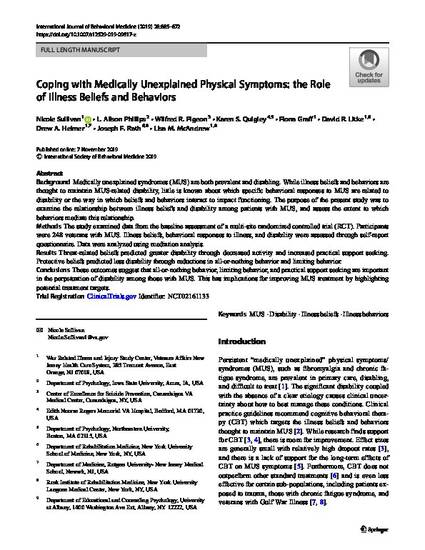
Background: Medically unexplained syndromes (MUS) are both prevalent and disabling. While illness beliefs and behaviors are thought to maintain MUS-related disability, little is known about which specific behavioral responses to MUS are related to disability or the way in which beliefs and behaviors interact to impact functioning. The purpose of the present study was to examine the relationship between illness beliefs and disability among patients with MUS, and assess the extent to which behaviors mediate this relationship.
Methods: The study examined data from the baseline assessment of a multi-site randomized controlled trial (RCT). Participants were 248 veterans with MUS. Illness beliefs, behavioral responses to illness, and disability were assessed through self-report questionnaire. Data were analyzed using mediation analysis.
Results: Threat-related beliefs predicted greater disability through decreased activity and increased practical support seeking. Protective beliefs predicted less disability through reductions in all-or-nothing behavior and limiting behavior.
Conclusions: These outcomes suggest that all-or-nothing behavior, limiting behavior, and practical support seeking are important in the perpetuation of disability among those with MUS. This has implications for improving MUS treatment by highlighting potential treatment targets.
Available at: http://works.bepress.com/lalison-phillips/27/

This article is published as Sullivan, Nicole, L. Alison Phillips, Wilfred R. Pigeon, Karen S. Quigley, Fiona Graff, David R. Litke, Drew A. Helmer, Joseph F. Rath, and Lisa M. McAndrew. "Coping with medically unexplained physical symptoms: the role of illness beliefs and behaviors." International Journal of Behavioral Medicine 26, no. 6 (2019): 665-672. DOI: 10.1007/s12529-019-09817-z